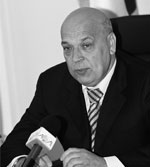
Islamic Terrorist Threat in the Crimea
Publication: Eurasia Daily Monitor Volume: 6 Issue: 223
By:

The head of the Crimean Interior Ministry, Gennadiy Moskal, has drafted new legislation to ban extremist groups in Ukraine (Ukrayinska Pravda, October 27). Moskal is also a Kyiv parliamentary deputy from the Our Ukraine-Peoples Self Defense faction (NUNS) and a member of the Peoples Self Defense party in the NUNS bloc, which is headed by his close ally Interior Minister Yuriy Lutsenko. “The police are concerned at the situation arising from the penetration into the Crimea of Islamic sects, some of them banned in most Islamic states,” one report stated (UNIAN, September 11).
The draft legislation is a product of Moskal’s new Crimean position after the Interior Ministry (MVS) and Security Service (SBU) received intelligence about the growth of Islamic terrorist groups in the peninsula. “Unfortunately in Ukraine we are faced with the problem that neither Hizb-ut-Tahrir al Islami (Islamic Liberation Party), al-Takfir wa al-Hijrah (Excommunication and Exile) and other terrorist, fundamentalist and extremist groups are not banned,” Moskal said (Ukrayinska Pravda, October 27). Hizb-ut-Tahrir is banned in many countries.
In the Crimea there are upwards of 100 members of Islamic fundamentalist groups who have arrived as political refugees from countries where they are outlawed. The largest origin of such members is Uzbekistan where Islamic fundamentalists have faced strong levels of repression from the security forces after mounting an armed uprising in Andijan against the Uzbek government in May 2005. Moskal has requested the State Committee for Ethnic and Religious Affairs to strip the leader of al-Takfir, Khudar Raad Mukhamad Alzhi Bur, of his Ukrainian refugee status.
Moskal pointed to how blasé the authorities had been in registering the Vozrozhdeniye newspaper which propagates support for an Islamic Caliphate and the ideas of Islamic fundamentalists. The SBU has blocked two websites –www.vozrojdenie.crimea.ua and www.qirim-vilayeti.org– run by Hizb-ut-Tahrir.
On July 19, Hizb-ut-Tahrir and its NGO, the Crimean Muslim Community Davet, held the Fifth Islamic conference in Simferopol entitled “From capitalist oppression and injustice to the light of the caliphate” (www.maidanua.org, July 24). 800 people took part in the conference (www.poluostrov.net, July 24). Some Islamic fundamentalists have entered the Crimea disguised as returning Crimean Tatars, 95 percent of whom have emigrated from Uzbekistan. Islamic fundamentalists in the Crimea include Tatars frustrated with the non-violent, Soviet dissident approach of former political prisoners who lead the Crimean Tatar movement, such as Mustafa Dzhemilev.
Dzhemilev’s bodyguards are now permitted to carry weapons to protect him and other senior Crimean Tatar leaders in the unofficial Tatar parliament, the Medzhilis (Ukrayinska Pravda, October 27). The decision to permit bodyguards to carry weapons came belatedly and only after Moskal and the SBU received intelligence that Islamic fundamentalists had plans to assassinate the Medhilis leadership and install radicals in their place.
Islamic fundamentalist groups operating in the Crimea have declared that Dzhemilev is not a true believer and therefore a potential target. Dzhemilev accused Russian military intelligence (GRU) of being behind planned assassination attempts, part of a wider plan to promote instability in the Crimea. Moskal has publicly stated his disagreement that Russia is behind these Islamic fundamentalists. Moskal believes the funding for these militants in the Crimea comes from the Taliban via Uzbekistan.
Free Islamic, Crimean Tatar and Arabic language courses are increasing in popularity in the Crimea overseen by the Spiritual Directorate of Crimean Muslims (Yani Dunya, Qirim, September 5). The funding for them comes from Saudi Arabia and Turkey, where there are large numbers of Tatar emigrants.
In October the Crimean police, who only began to turn their attention to the Islamic fundamentalist threat after Moskal’s appointment, detained members of al-Takfir. Most were former members of Hizb-ut-Tahrir who had defected to the more radical al-Takfir, and had stopped attending official Mosques and proclaimed their unwillingness to recognize the legitimacy of the Ukrainian state. The police reported that al-Takfir, “has started to actively prepare for armed jihad. They have bought and made weapons, studied literature on the tactics of guerrilla and subversion war in the conditions of Crimean mountain woods. They built a hideaway near the Chystenke village in Simferopol Region and recruited people for conducting radical extremist activities.” The police report added: “Literature and CD’s popularizing Wahhabism, in particular, its extreme wings like Hizb-ut-Tahrir and al-Takfir, were found and confiscated during a search in the house of a group member in the Dubky village. Also, manuals on the technical characteristics of weapons and certain explosives were found” (Interfax-Ukraine, October 6).
Three Sevastopol residents were arrested in Balaklava after seeking to sell weapons to undercover policemen. A search of their homes led the police to find more arms, hand grenades, detonators, improvised explosives and narcotics, suggesting a possible second avenue as drug dealers for providing income to the arms traffickers. The SBU and the MVS arrested 5 religious extremists and during a search of their homes found Kalashnikov AK-47 automatic rifles, plastic explosives with electric detonators, 16mm-calibre sawn-off guns, and explosive devices. In addition, terrorist, guerrilla warfare and survivalist manuals on how to survive and engage in warfare in wooded mountains and population centers, maps, and plans of terrorist actions were found (Interfax-Ukraine, October 23). Further searches in undisclosed Crimean hills found two hidden caches with explosives, weapons, camouflage fatigues and stored foodstuffs.
The lack of attention paid to these Islamic militants until now is surprising. The SBU has been focused on separatists and Russian extremists in the Crimea and from Russia while military counter-intelligence, in cooperation with the SBU, has shadowed the Black Sea Fleet. All three areas are seen in Kyiv as the greatest potential threat to Ukraine’s territorial integrity and sovereignty.
Islamic fundamentalists were not considered as a potential threat until this summer, because Ukraine is not seen as a potential target. This may be true after Ukraine withdrew its troops from Iraq in fall 2005. But, Ukraine has held joint exercises with NATO and the US for over 15 years in the Crimea, Odessa and Western Ukraine and American and NATO forces might become terrorist targets. Ukraine could also become a safe haven for Islamic terrorists seeking to enter the EU through Ukraine’s porous Western borders that are open to corruption from local officials, border troops and customs officers.




